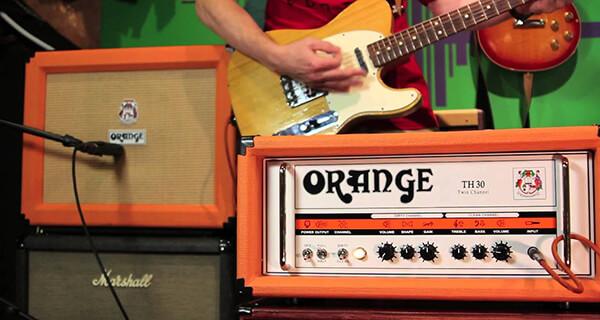Orange Rocker 15 Vs Marshall Origin 20 [Difference]
In the world of electric guitar amplifiers, the debate between tube amp aficionados often revolves around iconic brands like Orange and Marshall. These two industry giants have shaped the sound of generations of musicians, from the gritty British rock tones of Marshall to the bold and distinctive crunch of Orange. In this guide, we embark on a journey to unravel the intricacies of the Orange Rocker 15 vs Marshall Origin 20, two formidable amplifiers that represent the essence of their respective brands.

Both the Orange Rocker 15 and the Marshall Origin 20 have earned their stripes in the realm of tube amplifiers, boasting distinctive features, rich tonal palettes, and legacies that span decades. So, whether you’re a seasoned gigging musician or an aspiring bedroom rocker, join us on this sonic expedition as we dissect the Orange Rocker 15 and the Marshall Origin 20 to determine which one reigns supreme in the pursuit of sonic excellence.
# Table of Contents =>
1) Specifications:
When considering an amplifier, it’s essential to understand their technical specifications. Let’s take a closer look at the specs of the Orange Rocker 15 and Marshall Origin 20 to get a clear picture of what each offers.
a) Orange Rocker 15 Specifications:
- Power Output: 15 watts (switchable to 7 watts)
- Tubes: 2 x EL84, 3 x 12AX7
- Channels: Clean and Dirty
- Speaker: 1 x 10″ Voice of the World
b) Marshall Origin 20 Specifications:
- Power Output: 20 watts (switchable to 3 watts)
- Tubes: 2 x EL34, 3 x ECC83
- Channels: Normal and High Treble
- Speaker: 1 x 10″ Celestion V-Type
c) Comparison:
The Orange Rocker 15 has a slightly lower wattage but offers an additional switchable 7-watt mode, making it versatile for both home practice and small gigs. The Marshall Origin 20 has a higher wattage and a unique split between normal and high treble channels, catering to different tonal preferences. The choice between these two amplifiers may depend on your specific power requirements and tonal preferences.
Main Difference Between The Orange Rocker 15 Vs Marshall Origin 20:
2) Features:
The features of an amplifier can greatly impact your playing experience. Let’s examine the features of the Orange Rocker 15 and Marshall Origin 20 to understand what sets them apart.
a) Orange Rocker 15 Features:

i. Control Layout: The Orange Rocker 15 has a straightforward control layout with knobs for volume, treble, middle, bass, and a gain control for the dirty channel. It’s user-friendly and intuitive.
ii. Built-In Attenuator: One of the standout features of the Rocker 15 is its built-in attenuator, which is allowing you to shape the distinctive Orange tone at lower volume settings. This is making it an ideal companion for silent home practice sessions.
iii. Effects Loop: It includes a buffered effects loop, which is great for incorporating time-based effects like delay and reverb.
b) Marshall Origin 20 Features:

i. Control Layout: The Origin 20 features a control layout similar to classic Marshall amplifiers, with knobs for gain, treble, middle, bass, and volume. It’s easy for fans of traditional Marshall tones to navigate.
ii. Boost Functionality: A unique feature is the boost switch, which provides an extra kick of gain for soloing or pushing the amp into overdrive.
iii. Effects Loop: Like the Orange Rocker 15, it also comes equipped with an effects loop for integrating pedals seamlessly.
c) Feature Comparison:
The Orange Rocker 15’s built-in attenuator is a significant advantage for those who need to manage volume levels, making it a strong choice for bedroom practice. The Marshall Origin 20’s boost function offers versatility, allowing you to go from cleaner tones to classic Marshall crunch with ease. Consider your playing style and the features that matter most to you when making a decision.
3) Tone and Sound Quality:

The most critical aspect of any amplifier is its sound. Let’s explore the tonal characteristics and sound quality of the Orange Rocker 15 and Marshall Origin 20.
a) Orange Rocker 15 Sound:
i. Clean Channel: The Orange Rocker 15’s clean channel delivers a warm and articulate tone with a hint of British flavor. It’s ideal for classic rock and blues.
ii. Dirty Channel: Switching to the dirty channel, you’ll experience the signature Orange overdrive, characterized by its rich saturation and harmonic complexity. It excels in rock and heavier genres.
iii. Versatility: While known for its overdrive tones, the Rocker 15’s clean channel is versatile enough for various styles, making it a well-rounded choice.
b) Marshall Origin 20 Sound:
i. Clean Channel: The Origin 20’s clean channel offers that classic Marshall clarity with a touch of chime. It’s excellent for clean and slightly driven tones.
ii. Dirty Channel: The dirty channel unleashes the iconic Marshall roar, with a pronounced midrange and aggressive character. It’s a favorite among hard rock and classic rock enthusiasts.
iii. Versatility: While the Marshall Origin 20 excels in classic rock tones, its clean channel provides a platform for versatility, especially with the boost engaged.
c) Sound Quality Comparison:
The Orange Rocker 15 leans towards a slightly warmer and more saturated overdrive, making it ideal for modern rock and heavy styles. The Marshall Origin 20 is known for its classic Marshall crunch and midrange presence, making it a go-to choice for those seeking vintage rock tones. Your preference for one over the other will depend on your preferred genre and tonal character.
4) Build Quality and Durability:
An amplifier’s build quality and durability are essential factors to consider, especially if you plan to gig or transport it frequently.
a) Orange Rocker 15 Build Quality:
- Orange amplifiers are renowned for their rugged build quality. The Rocker 15 features a sturdy, closed-back cabinet and robust components that can withstand the rigors of the road.
- The distinctive orange tolex and grille cloth add to its durability and aesthetics.
b) Marshall Origin 20 Build Quality:
- Marshall amplifiers are also known for their durability. The Origin 20 boasts a well-constructed enclosure and quality components.
- The classic Marshall design elements give it a timeless appearance.
c) Durability Comparison:
Both amplifiers are built to last, with reliable construction and quality materials. Your choice here may come down to personal preference in terms of aesthetics, as both brands have their distinct visual appeal.
5) Price:
Pricing is a crucial factor when making any purchase decision. Let’s examine the price points and the overall value for money offered by the Orange Rocker 15 and Marshall Origin 20.
a) Orange Rocker 15 Price:
- The Orange Rocker 15 is generally priced in the mid-range category for tube amplifiers.
- Considering its versatile features, including the built-in attenuator, it offers good value for musicians seeking the renowned Orange tone.
b) Marshall Origin 20 Price:
- The Marshall Origin 20 is also positioned in the mid-range price bracket for tube amplifiers.
- It provides excellent value for those craving the classic Marshall sound with the added boost feature.
c) Value for Money Comparison:
Both amplifiers offer competitive pricing for their respective brand reputations and sound quality. The choice here will largely depend on your tonal preferences, as well as the specific features that align with your playing style.
Read: Can You Use the Same Amp for Guitar and Bass [Solved]
6) User Reviews & Feedback:
It’s essential to consider the experiences of other musicians who have used these amplifiers. Let’s take a look at user reviews and common feedback trends.
a) Orange Rocker 15 User Reviews:
- Many users praise the Orange Rocker 15 for its signature overdrive tones, citing its versatility and reliability.
- The built-in attenuator is frequently mentioned as a standout feature, allowing for quiet practice without sacrificing tone.
b) Marshall Origin 20 User Reviews:
- Users of the Marshall Origin 20 appreciate its classic Marshall tones and the boost function for added versatility.
- The amp’s durability and build quality are often mentioned positively in reviews.
c) Common Feedback Trends:
Both amplifiers receive favorable feedback for their sound quality and build. Individual preferences play a significant role in users’ choices, with some favoring the Orange for modern rock and others leaning towards the Marshall for vintage tones.
Conclusion:
After a detailed examination of the Orange Rocker 15 and Marshall Origin 20, it’s clear that both amplifiers have their strengths and unique characteristics.
a) Summarizing the Differences:
- The Orange Rocker 15 offers a warmer and more modern overdrive tone, making it suitable for contemporary rock styles.
- The Marshall Origin 20 excels in classic Marshall crunch and vintage rock tones, with the added benefit of a boost function.
b) Choosing the Right Amplifier for You:
- Consider your playing style, preferred genres, and specific feature requirements when making a choice.
- If you need an amplifier for bedroom practice with a built-in attenuator, the Orange Rocker 15 is an excellent choice.
- If you crave classic Marshall tones and appreciate the versatility of a boost function, the Marshall Origin 20 won’t disappoint.
In conclusion, the choice between the Orange Rocker 15 vs Marshall Origin 20 ultimately boils down to personal preference and the specific needs of your musical journey. Both amplifiers have their unique sonic characteristics and features, making them valuable additions to any guitarist’s arsenal.
Consider your playing style, budget, and tonal aspirations to determine which amplifier suits you best. Regardless of your choice, you’ll be investing in a piece of musical history that can help you achieve your desired tones and inspire your creativity.
You may also like: Bass and Guitar Amp Combined [What is Difference]
Last Updated on October 13, 2023 by Perry Garner


